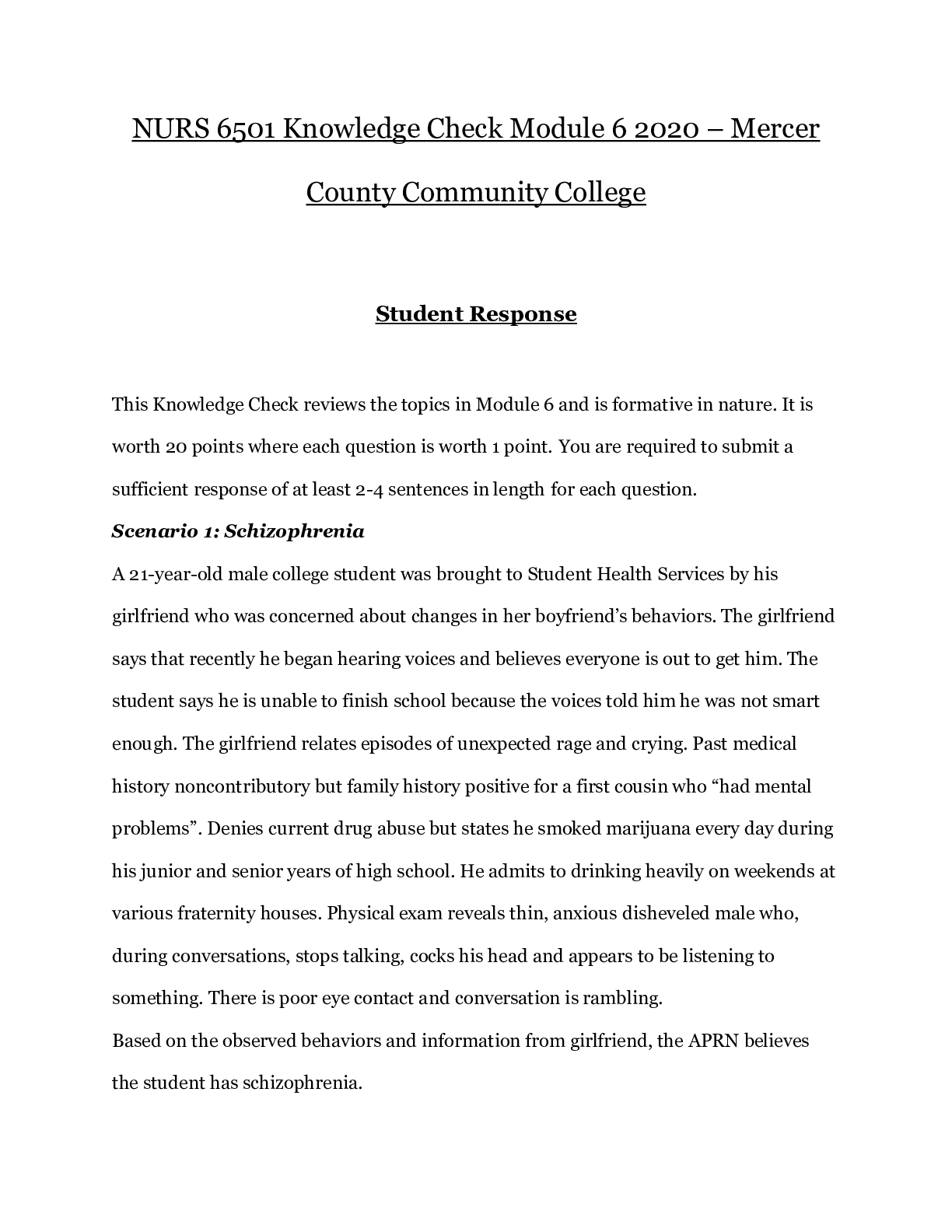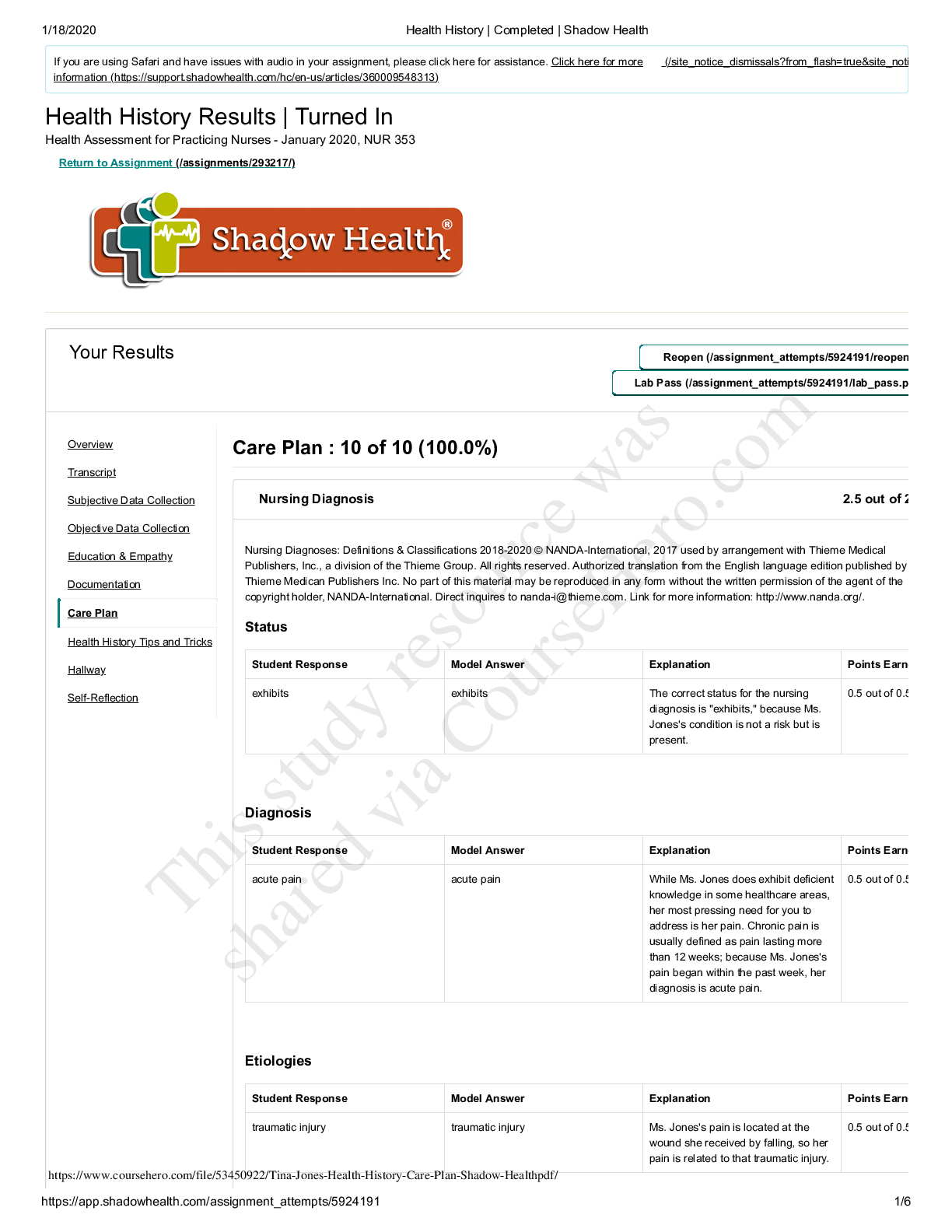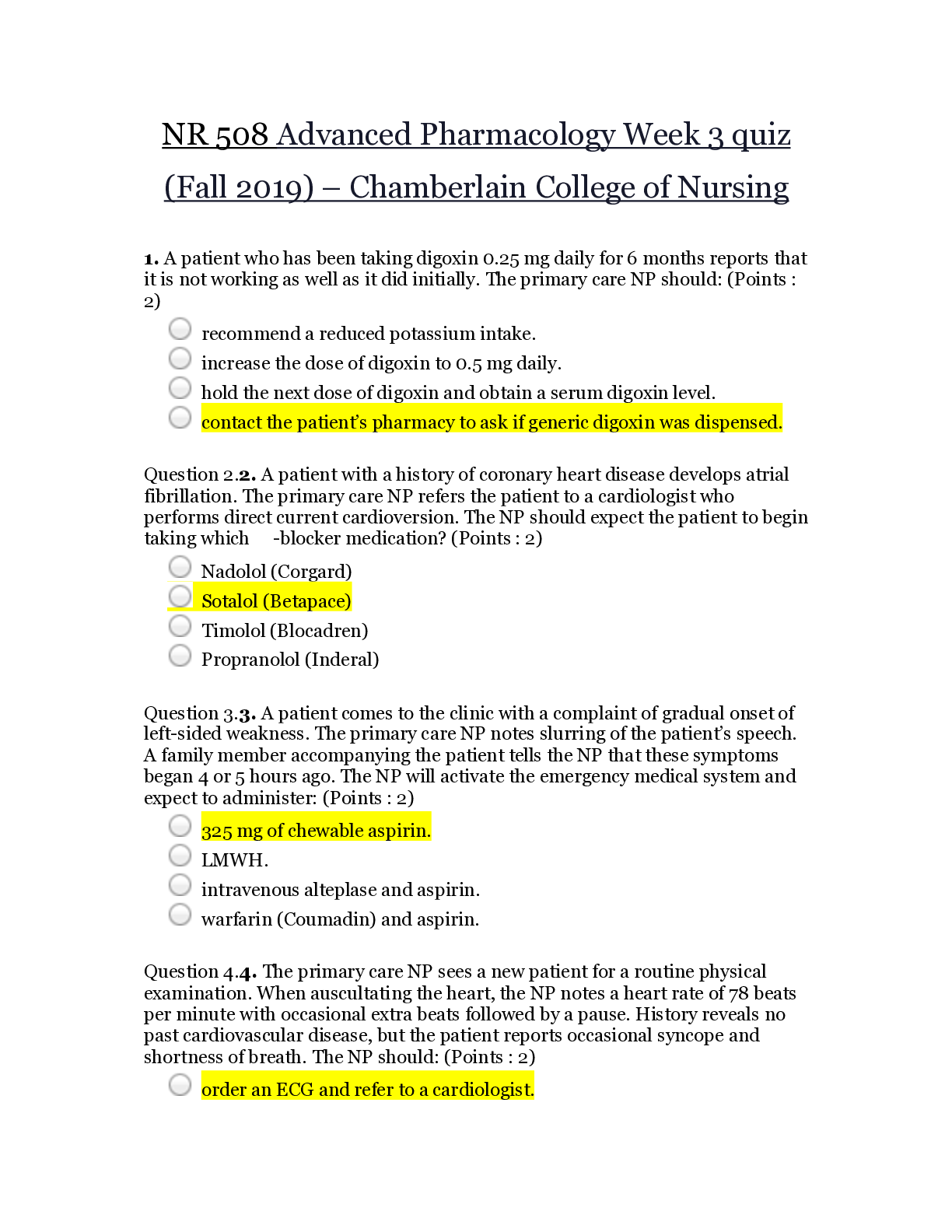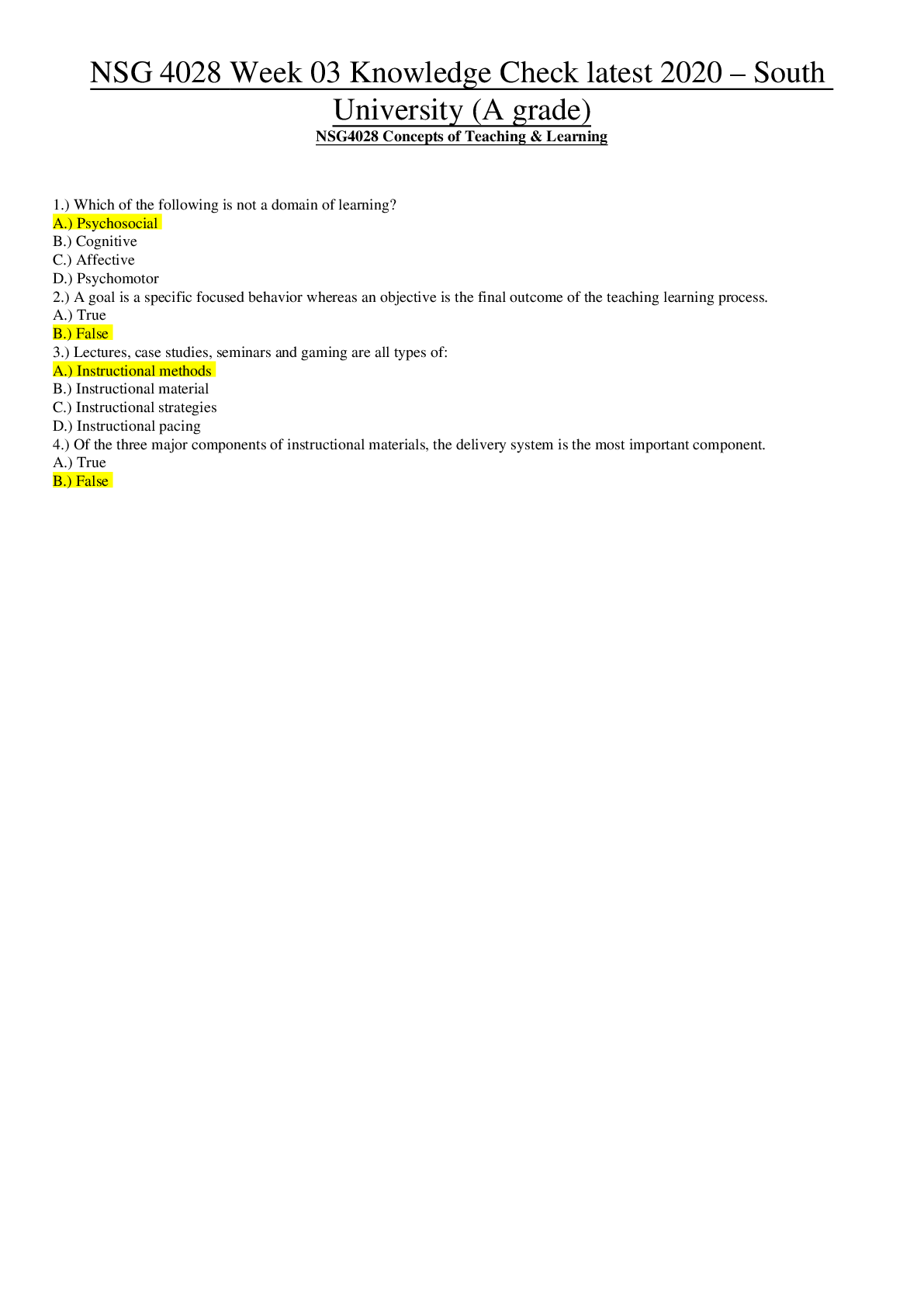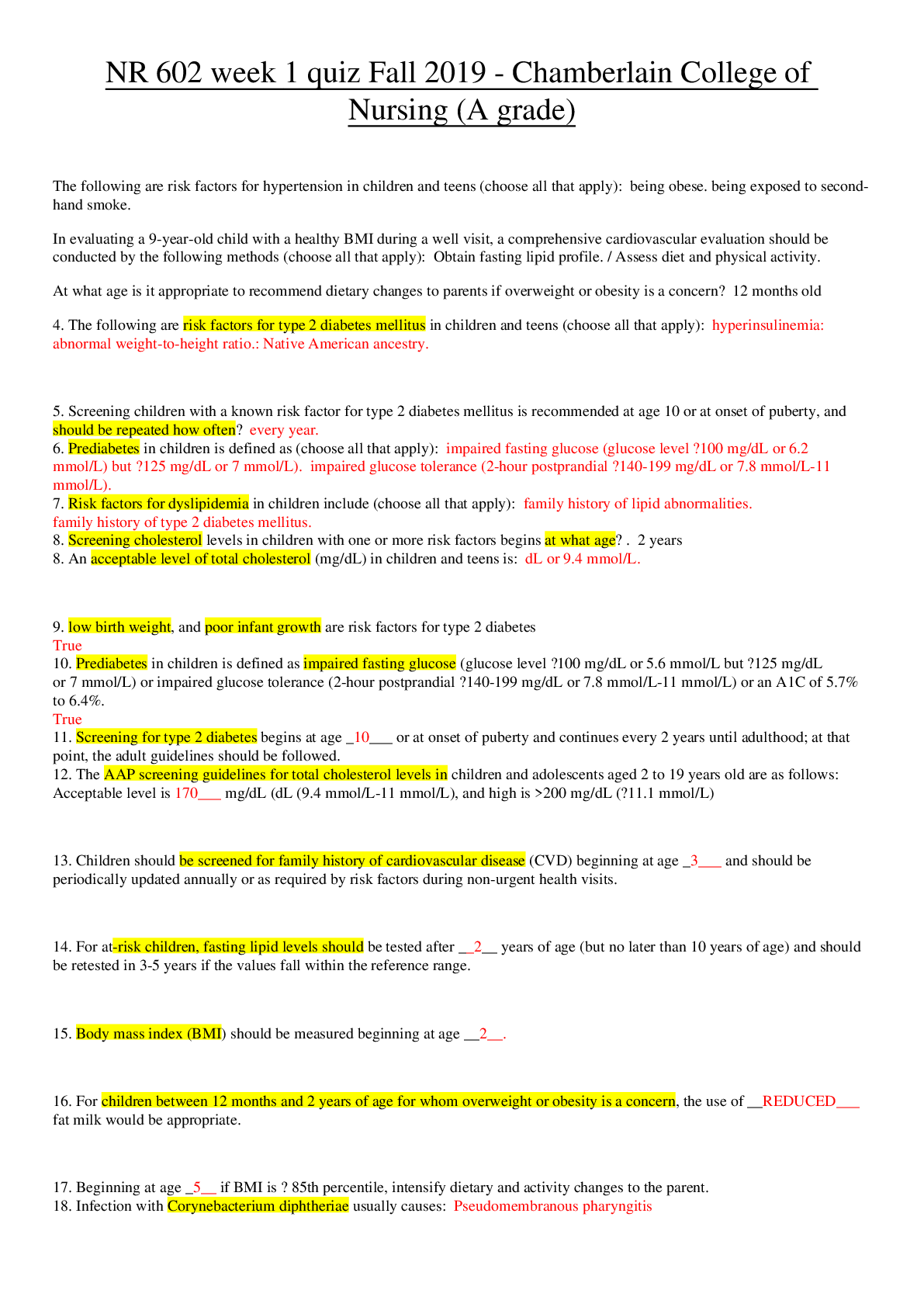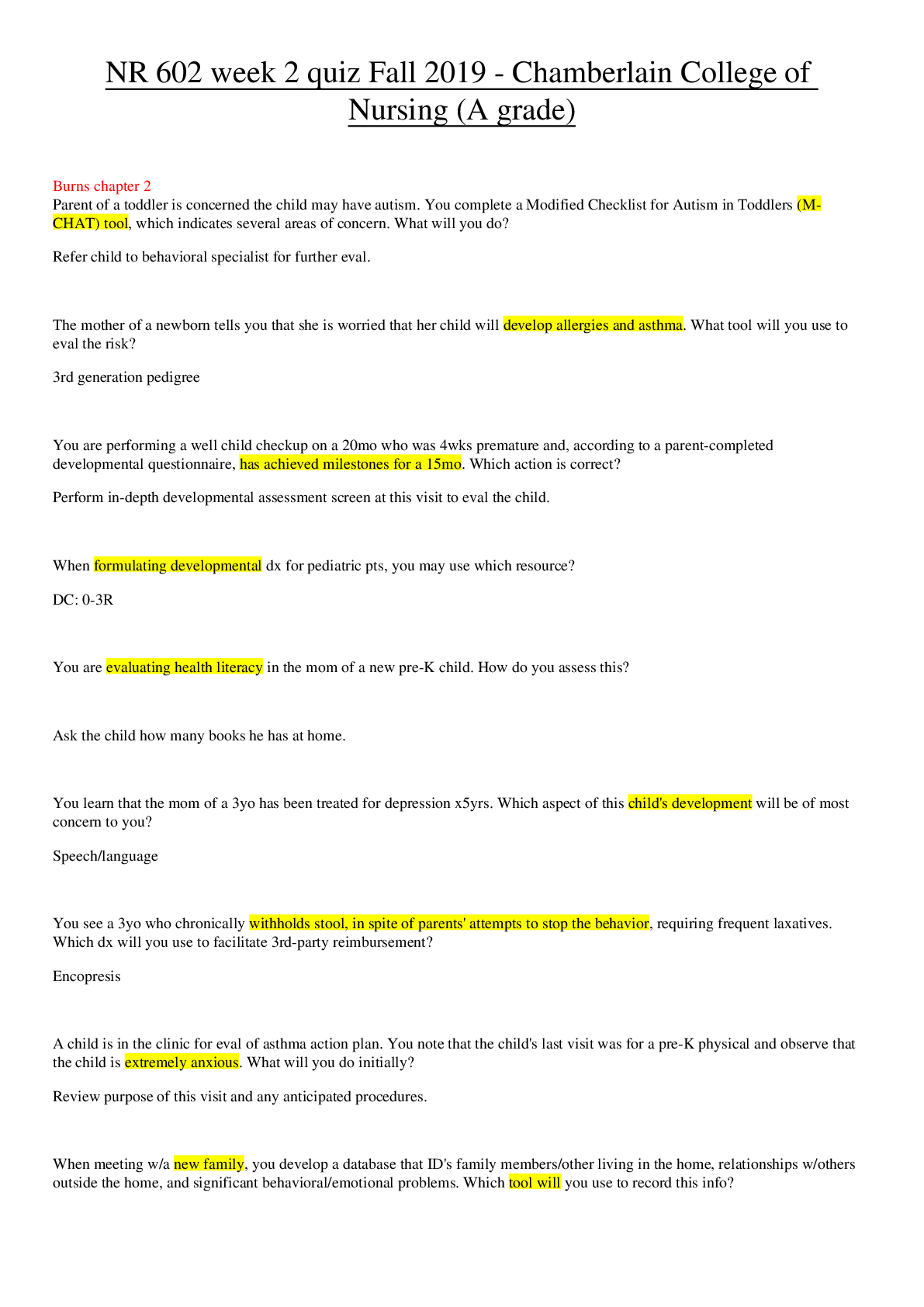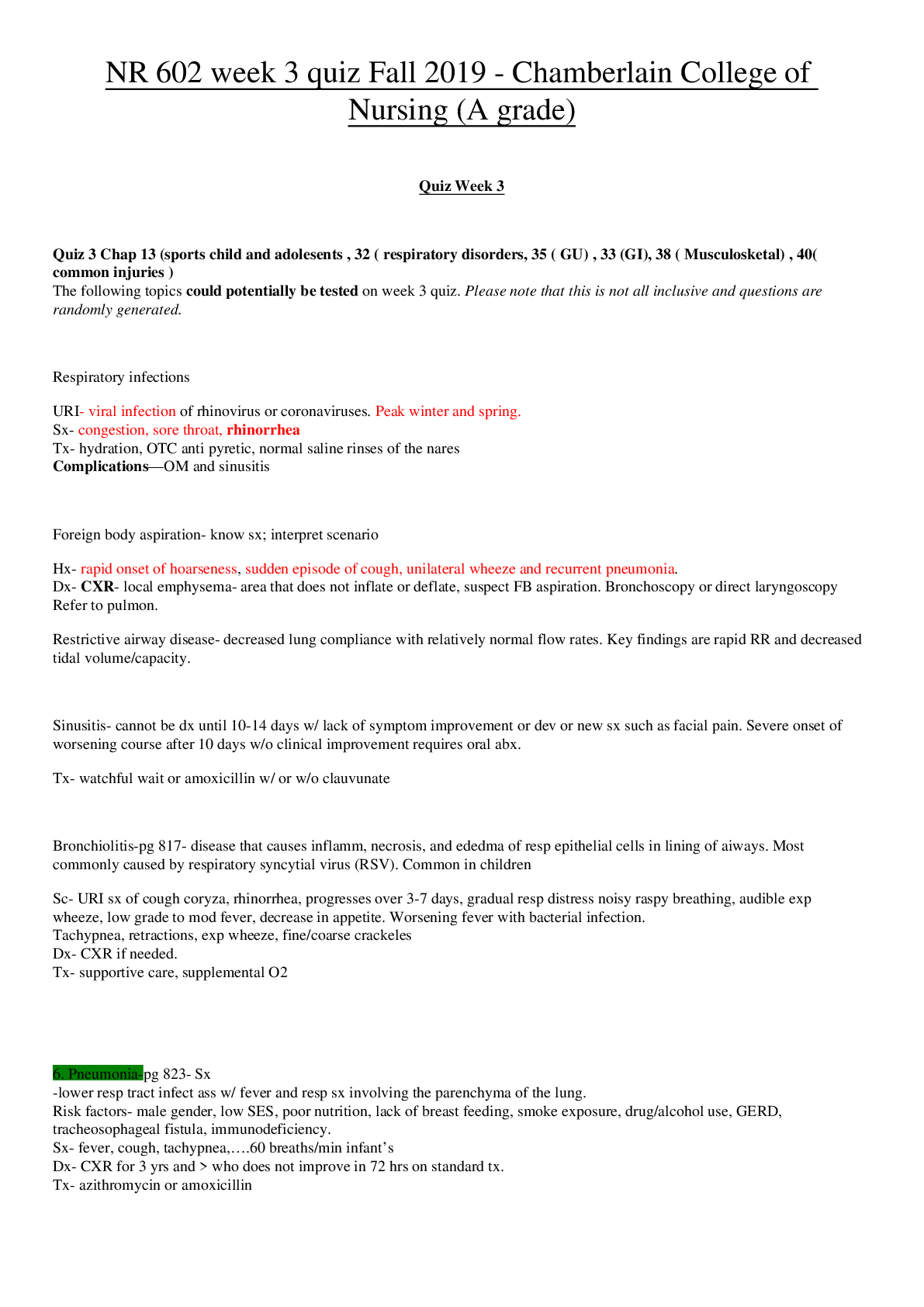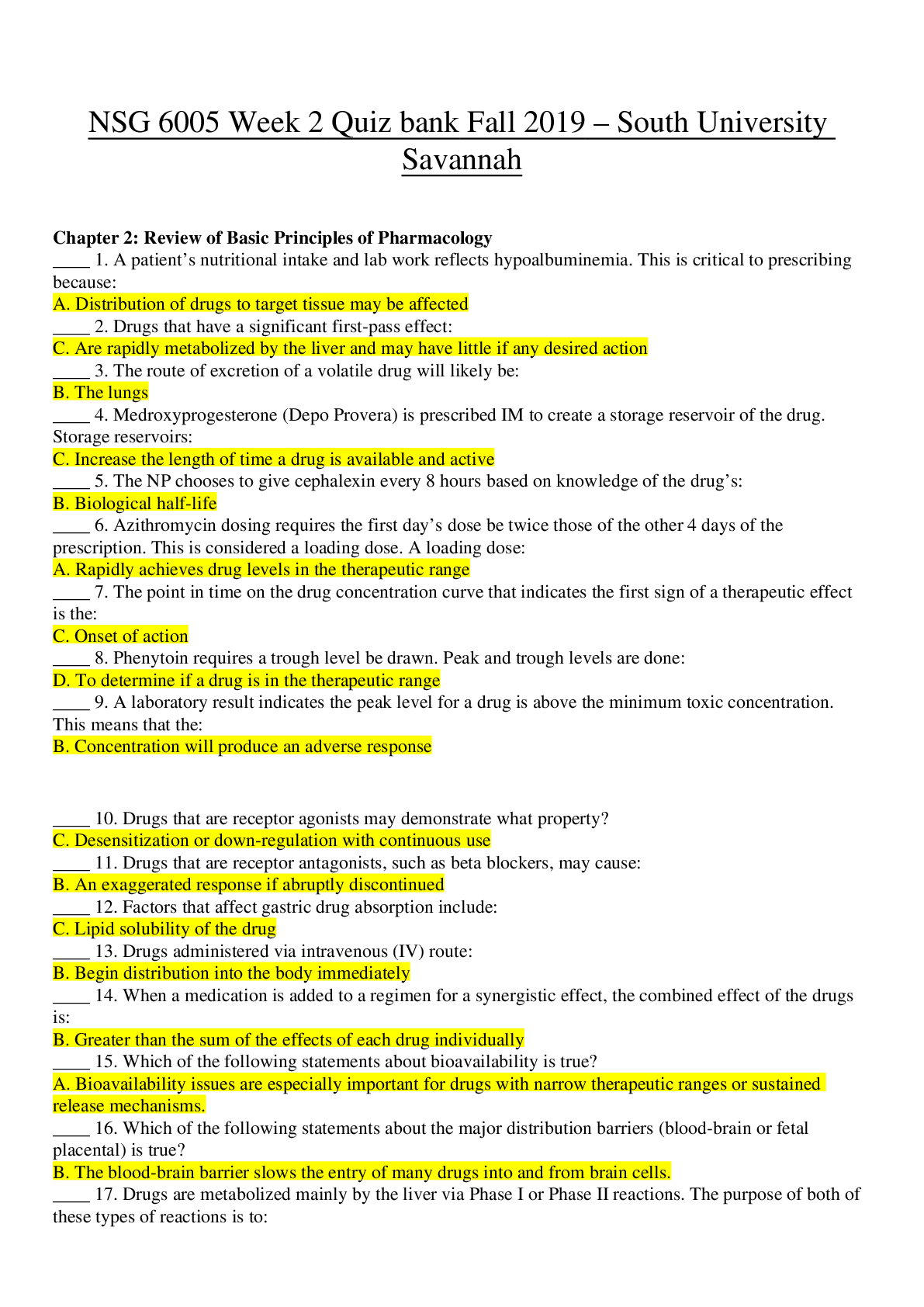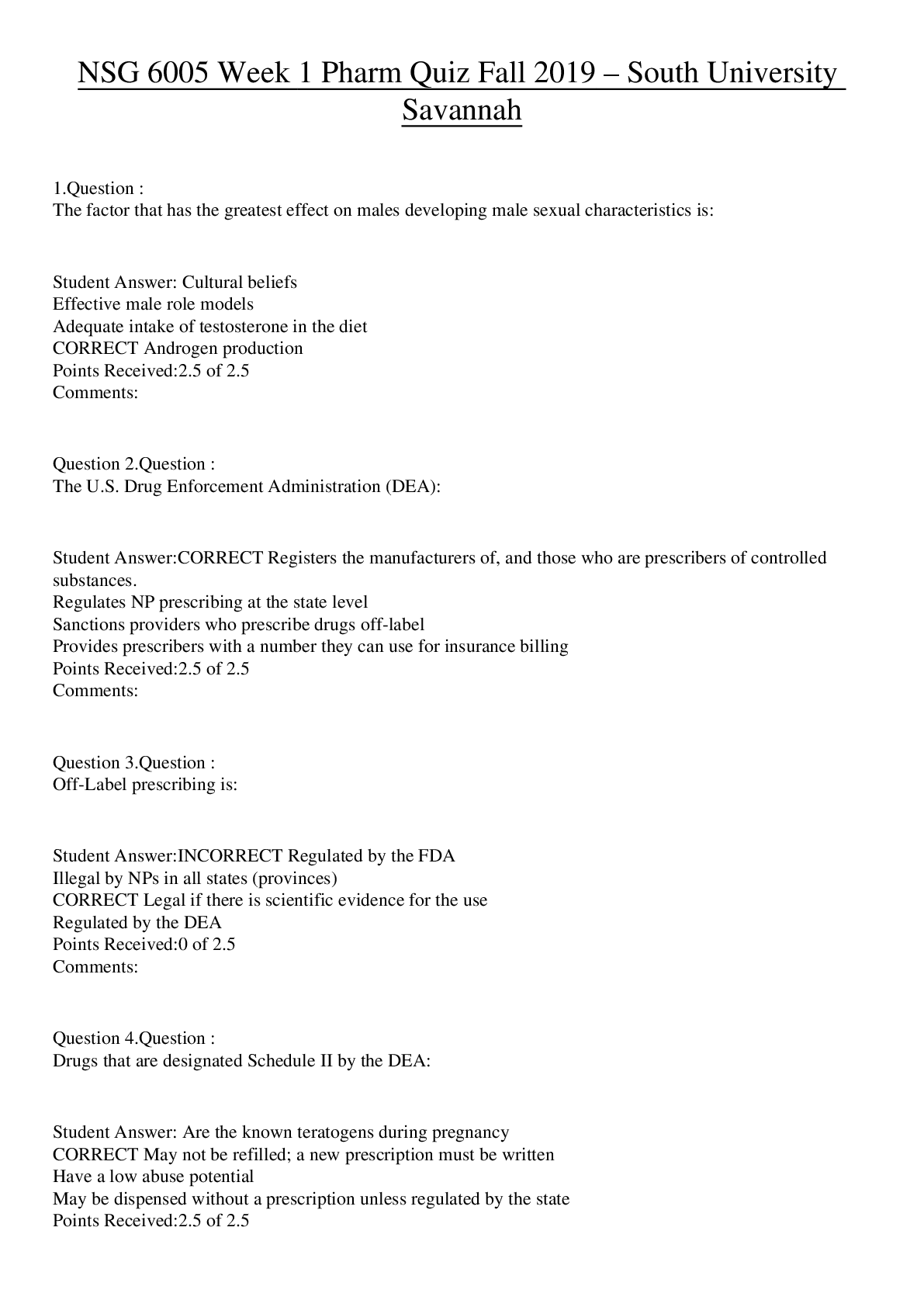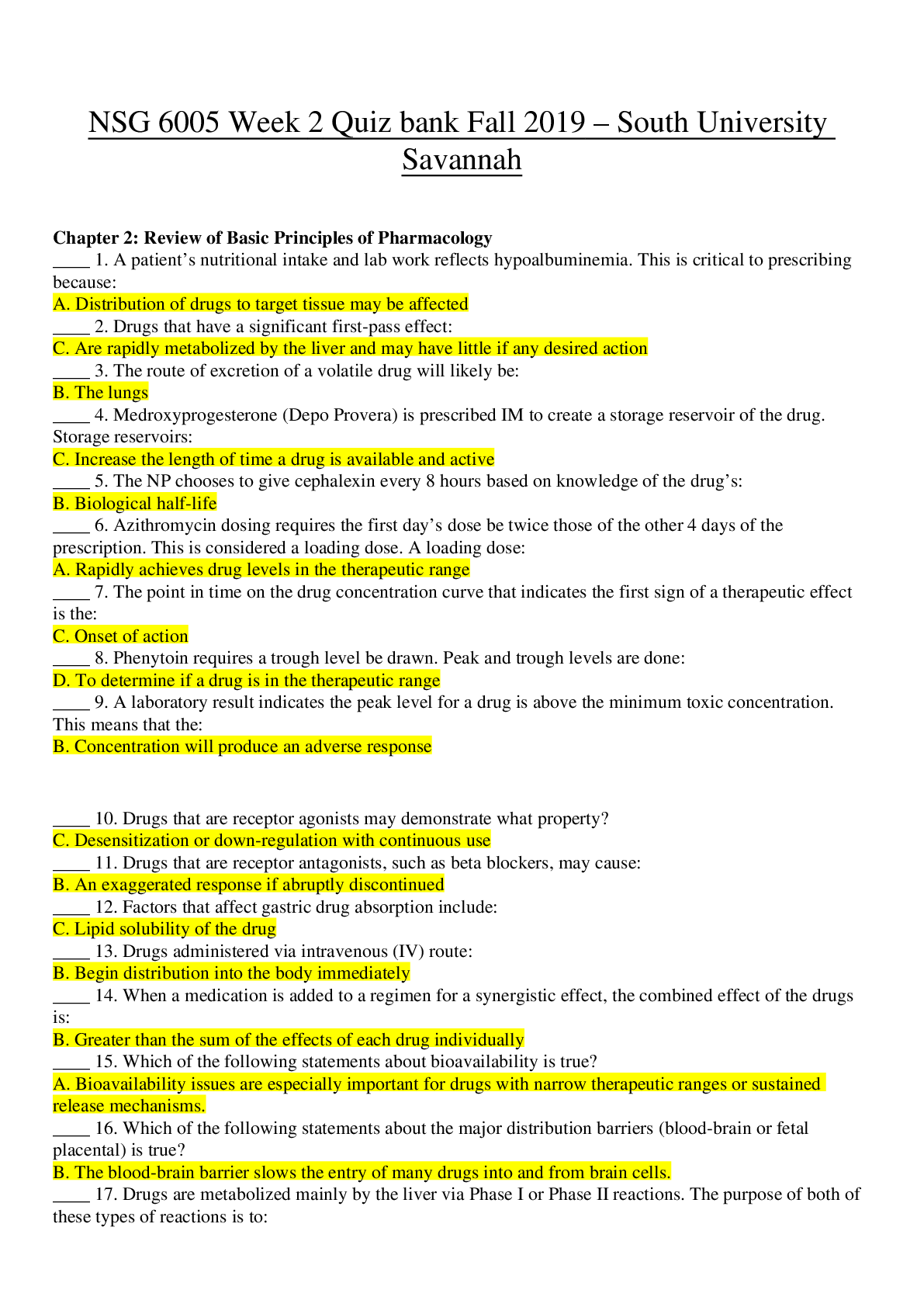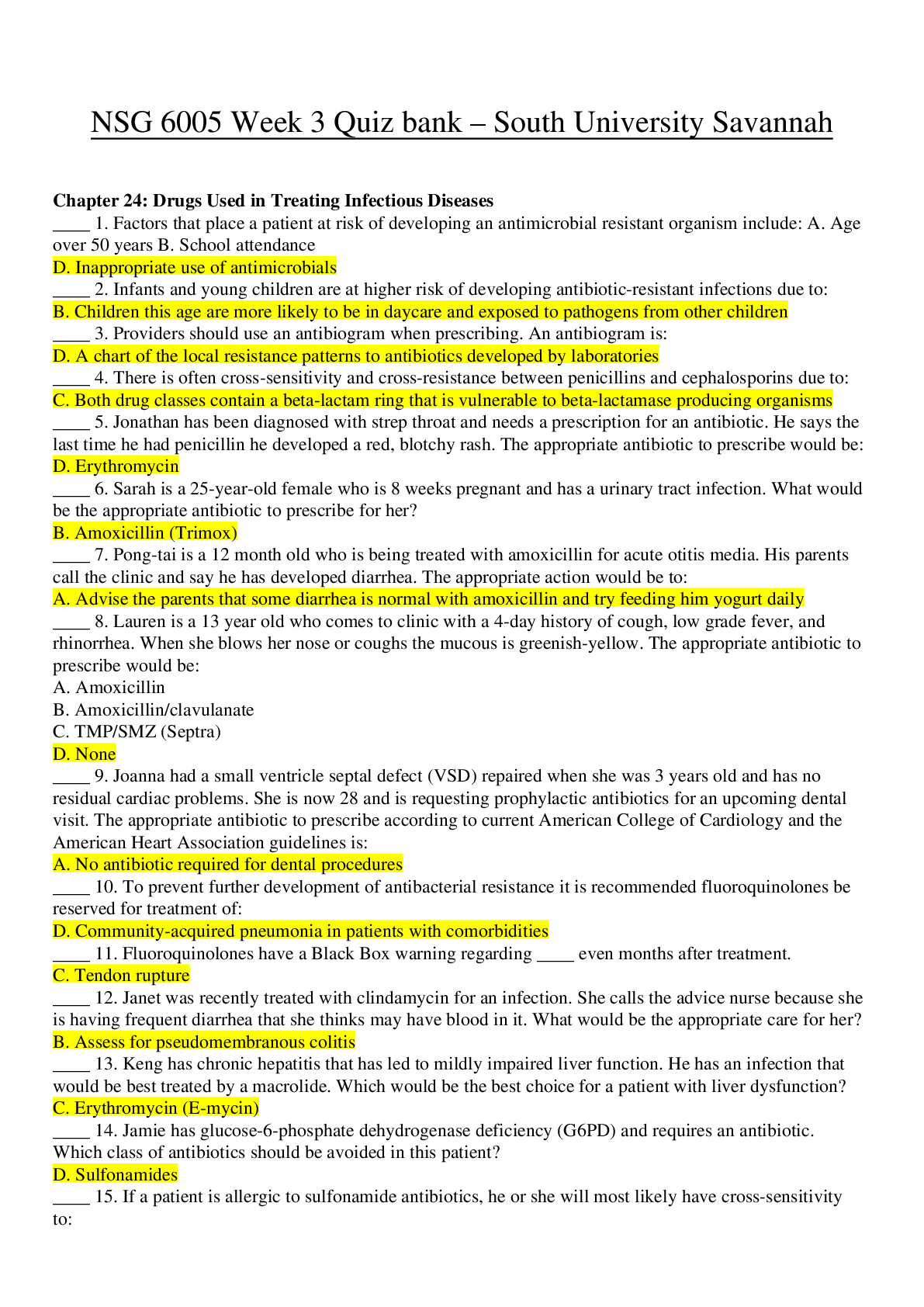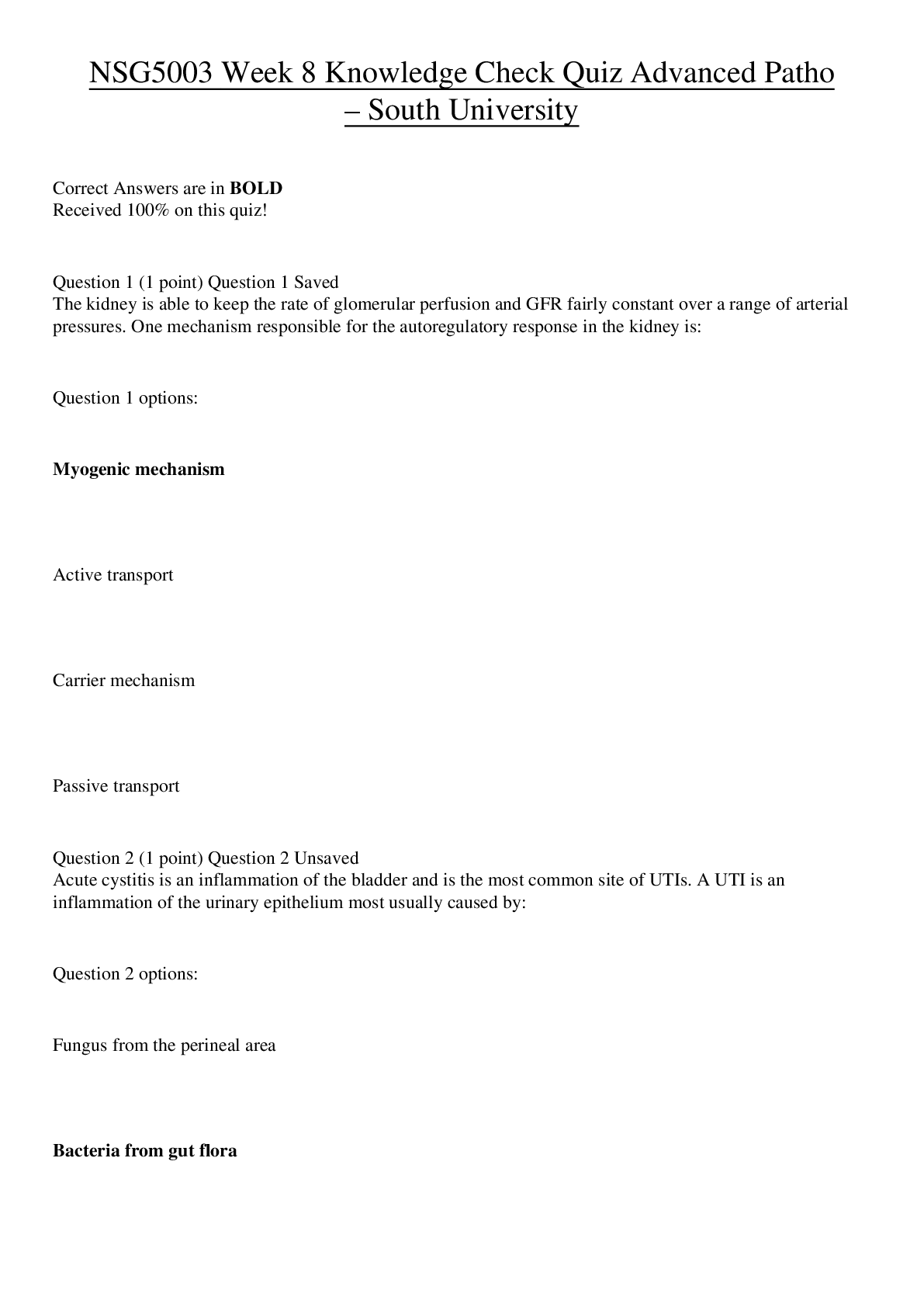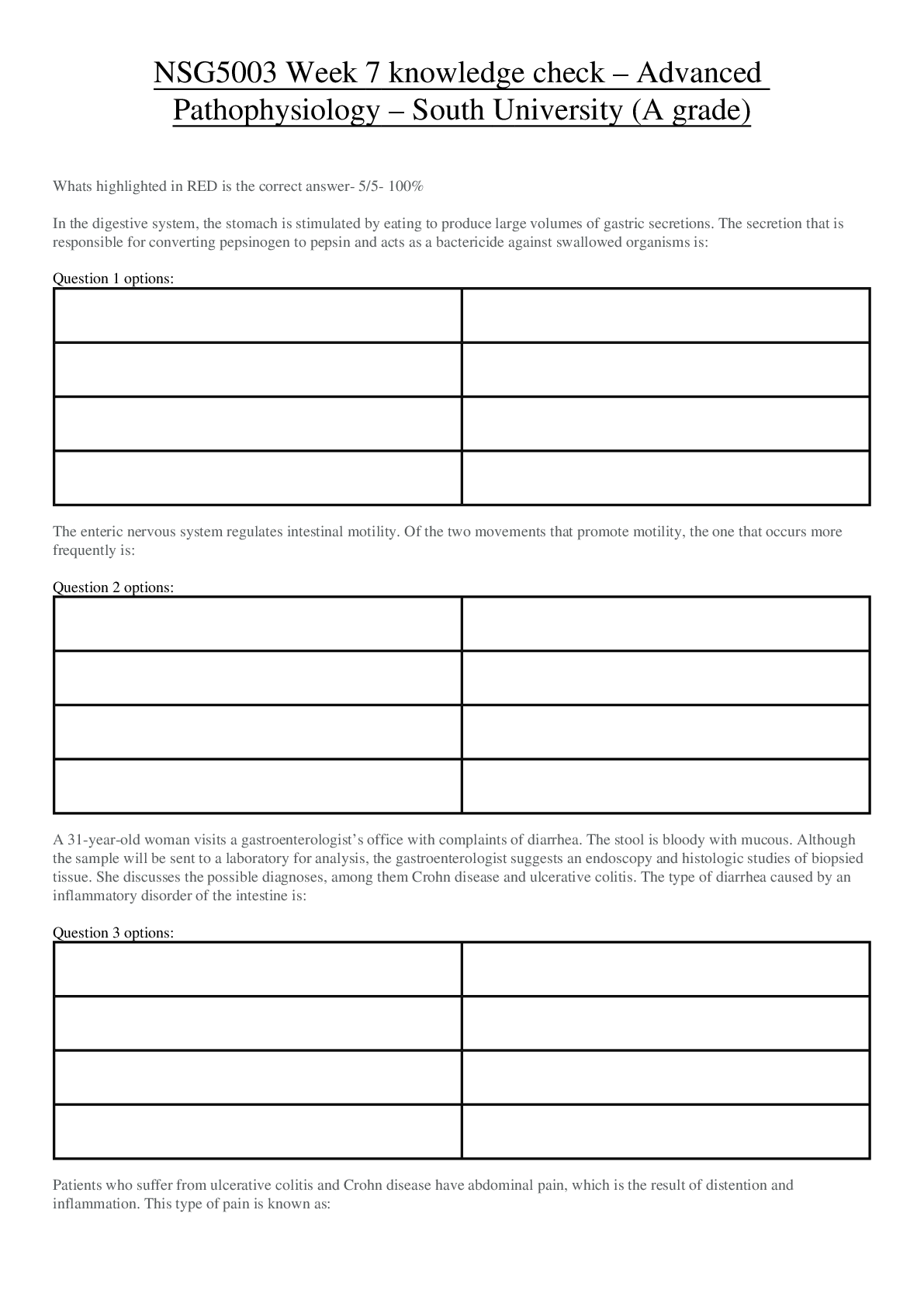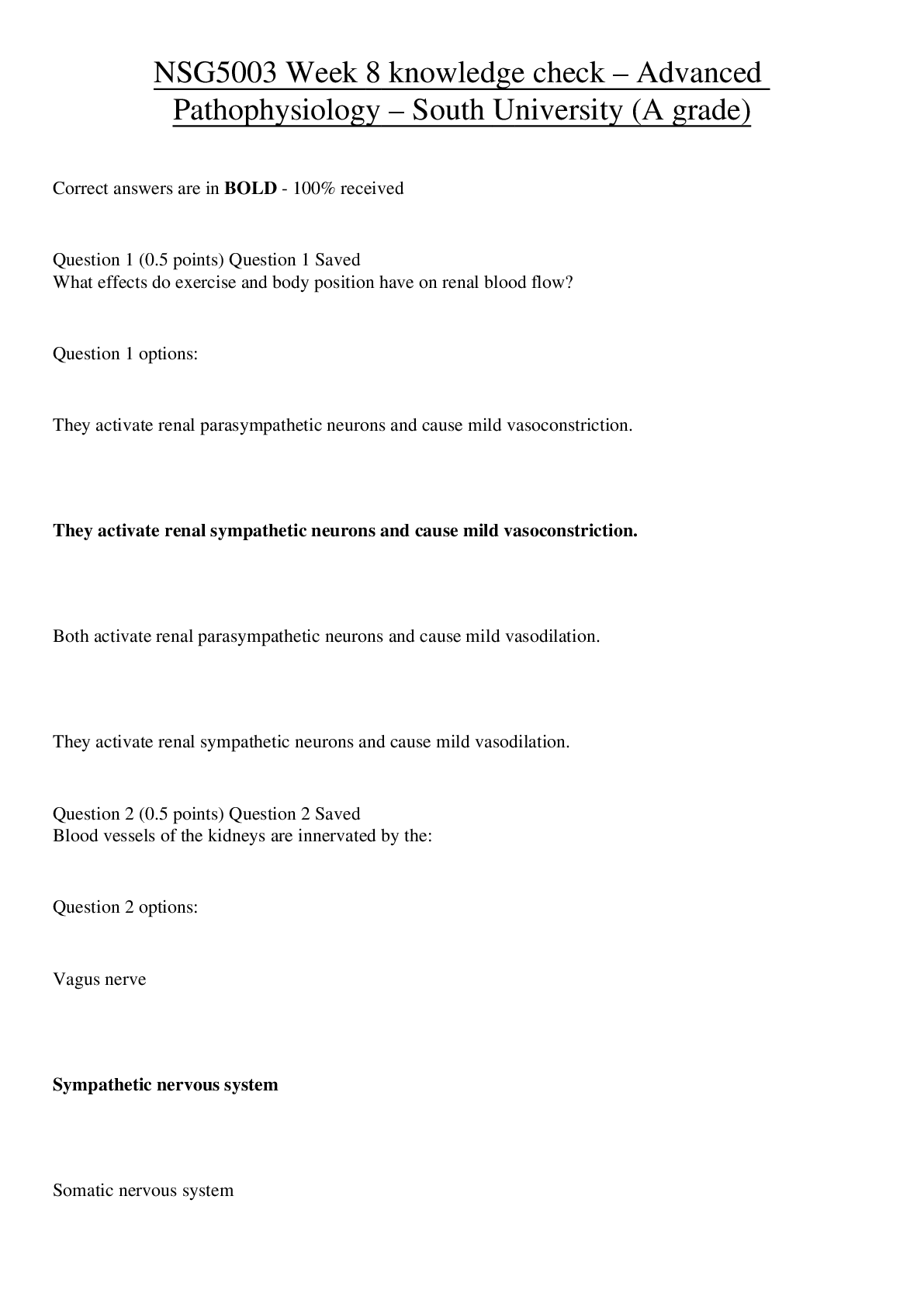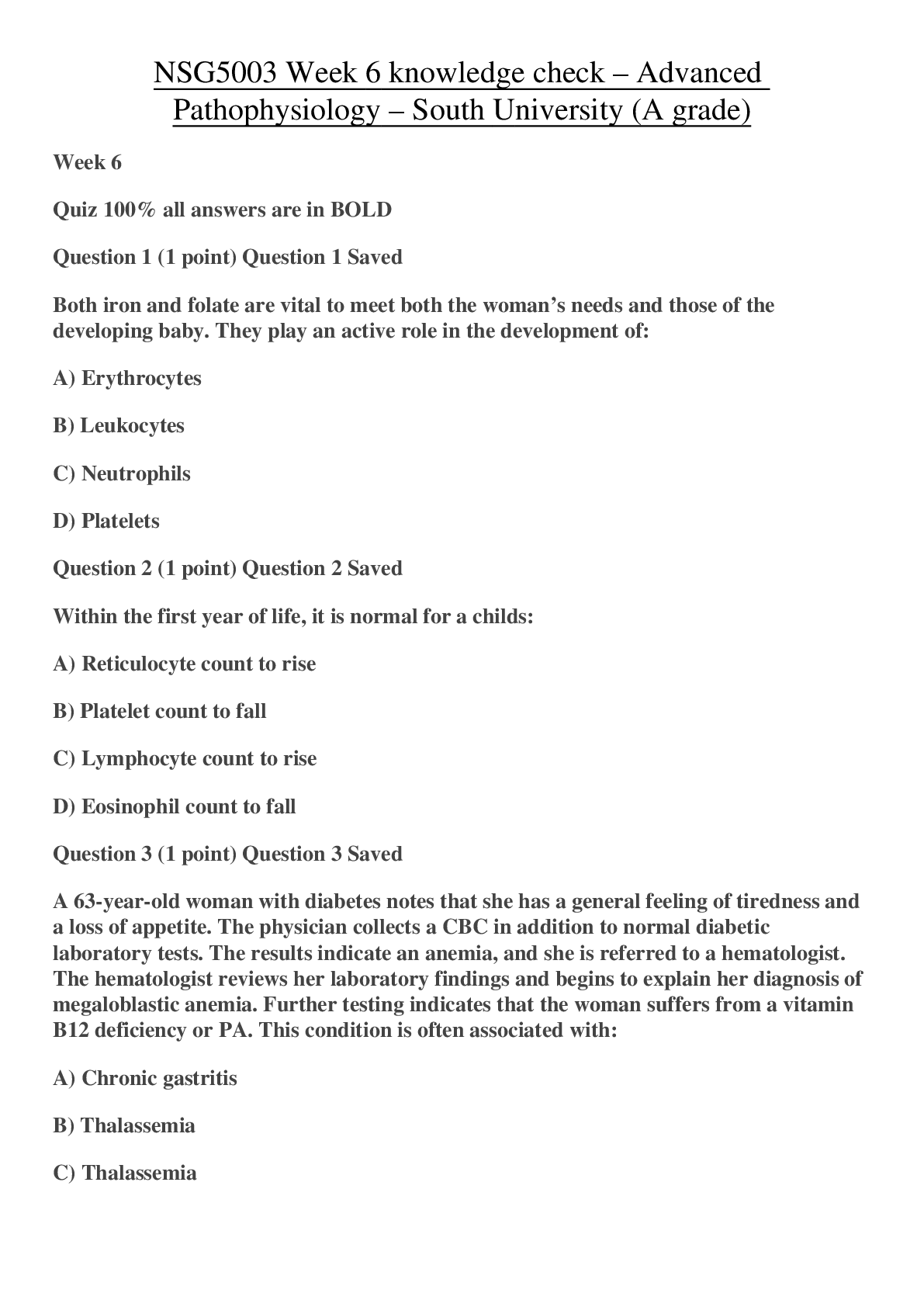Pharmacology > EXAM > NSG 6005 Week 4 Pharm Quiz Fall 2019 – South University Savannah / NSG 6005 Week 4 Pharm Quiz Fall (All)
NSG 6005 Week 4 Pharm Quiz Fall 2019 – South University Savannah / NSG 6005 Week 4 Pharm Quiz Fall 2019
Document Content and Description Below
NSG 6005 Week 4 Pharm Quiz Fall 2019 – South University Savannah 1. Question : When using the “step-up” approach in caring for a patient with GERD, the “step up” from OTC antacid us... e is: Student Answer: Prokinetic (metoclopramide) for four to eight weeks A PPI (omeprazole) for twelve weeks Histamine 2 receptor antagonist (ranitidine) for four to eight weeks Cytoprotective drug (misoprostol) for two weeks Points Received: 2.5 of 2.5 Comments: Question 2. Question : Kelly has diarrhea and is wondering if she can take loperamide (Imodium) for the diarrhea. Loperamide: Student Answer: Can be given to patients of all ages, including infants and children, for viral gastroenteritis Slows gastric motility and reduces fluid and electrolyte loss from diarrhea Is the treatment of choice for the diarrhea associated with E. coli 0157 May be used in pregnancy and by lactating women Points Received: 2.5 of 2.5 Comments: Question 3. Question : Long-acting beta-agonists received a black box warning from the US Food and Drug Administration due to the: Student Answer: Risk of life-threatening dermatological reactions Increased incidence of cardiac events when long-acting beta-agonists are used Increased risk of asthma-related deaths when long-acting beta-agonists are used Risk for life-threatening alterations in electrolytes Points Received: 2.5 of 2.5 Comments: Question 4. Question : Decongestants such as pseudoephedrine (Sudafed): Student Answer: Are Schedule III drugs in all states Should not be prescribed or recommended for children under four years of age Are effective in treating the congestion children experience with the common cold May cause drowsiness in patients of all ages Points Received: 2.5 of 2.5 Comments: Question 5. Question : If a patient with H. pylori positive PUD fails first-line therapy, the second-line treatment is: Student Answer: A PPI BID plus metronidazole plus tetracycline plus bismuth subsalicylate for fourteen days Testing H. pylori for resistance to common treatment regimens A PPI plus clarithromycin plus amoxicillin for fourteen days A PPI and levofloxacin for fourteen days Points Received: 2.5 of 2.5 Comments: Question 6. Question : Lifestyle changes are the first step in the treatment of GERD. A food that may aggravate GERD is: Student Answer: Eggs Honey Dew Chocolate Chicken Points Received: 0 of 2.5 Comments: Question 7. Question : Many patients self-medicate with antacids. Which patients should be counseled to not take calcium carbonate antacids without discussing with their providers or a pharmacist first? Student Answer: Patients with kidney stones Pregnant patients Patients with heartburn Postmenopausal women Points Received: 2.5 of 2.5 Comments: Question 8. Question : Christy has exercise and mild persistent asthma and is prescribed two puffs of albuterol fifteen minutes before exercise and as needed for wheezing. One puff per day of beclomethasone (Qvar) is also prescribed. Teaching regarding her inhalers includes which one of the following? Student Answer: She should use one to two puffs of albuterol per day to prevent an attack, with no more than eight puffs per day. Beclomethasone needs to be used every day to treat her asthma. She should report any systemic side effects she is experiencing, such as weight gain. She should use the albuterol MDI immediately after her corticosteroid MDI to facilitate bronchodilation. Points Received: 2.5 of 2.5 Comments: Question 9. Question : Tiotropium bromide (Spiriva) is an inhaled anticholinergic: Student Answer: Used for the treatment of COPD Used in the treatment of asthma Combined with albuterol for the treatment of asthma exacerbations Combined with fluticasone for the treatment of persistent asthma Points Received: 2.5 of 2.5 Comments: Question 10. Question : One goal of asthma management in children is: Student Answer: They should independently manage their asthma. They should participate in school and sports activities. There should be no exacerbations. The use of inhaled corticosteroids should be minimal. Points Received: 2.5 of 2.5 Comments: Question 11. Question : Asthma exacerbations at home are managed by the patient by: Student Answer: Increasing the frequency of beta 2 agonists and contacting his or her provider Doubling inhaled corticosteroid dose Increasing the frequency of beta 2 agonists Starting montelukast (Singulair) Points Received: 2.5 of 2.5 Comments: Question 12. Question : Howard is a seventy-two-year-old male who occasionally takes diphenhydramine for his seasonal allergies. Monitoring for this patient taking diphenhydramine would include assessing for: Student Answer: Urinary retention Cardiac output Peripheral edema Skin for rash Points Received: 2.5 of 2.5 Comments: Question 13. Question : Patients who are on chronic long-term PPI therapy require monitoring for: Student Answer: Iron deficiency anemia, vitamin B12, and calcium deficiency Folate and magnesium deficiency Elevated uric acid levels leading to gout Hypokalemia and hypocalcemia Points Received: 2.5 of 2.5 Comments: Question 14. Question : Prior to developing a plan for the treatment of asthma, the patient’s asthma should be classified according to the National Heart, Lung, and Blood Institute (NHLBI) Expert Panel 3 guidelines. In adults, mild-persistent asthma is classified as asthma symptoms that occur: Student Answer: Daily Daily and limit physical activity Less than twice a week More than twice a week and less than once a day Points Received: 2.5 of 2.5 Comments: Question 15. Question : Second-generation antihistamines such as loratadine (Claritin) are prescribed for seasonal allergies because they: Student Answer: Are more effective than first-generation antihistamines Are less sedating than first-generation antihistamines Are prescription products and, therefore, are covered by insurance Can be taken with CNS sedatives, such as alcohol Points Received: 2.5 of 2.5 Comments: Question 16. Question : Patients with allergic rhinitis may benefit from a prescription of: Student Answer: Fluticasone (Flonase) Cetirizine (Zyrtec) OTC cromolyn nasal spray (Nasalcrom) Any of the above Points Received: 2.5 of 2.5 Comments: Question 17. Question : Montelukast (Singulair) may be prescribed for: Student Answer: A six-year-old with exercise-induced asthma. A two-year-old with moderate persistent asthma. An eighteen-month-old with seasonal allergic rhinitis. None of the above; montelukast is not approved for use in children. Points Received: 2.5 of 2.5 Comments: Question 18. Question : A patient with a COPD exacerbation may require: Student Answer: Doubling of inhaled corticosteroid dose Systemic corticosteroid burst Continuous inhaled beta 2 agonists Leukotriene therapy Points Received: 2.5 of 2.5 [Show More]
Last updated: 1 year ago
Preview 1 out of 8 pages
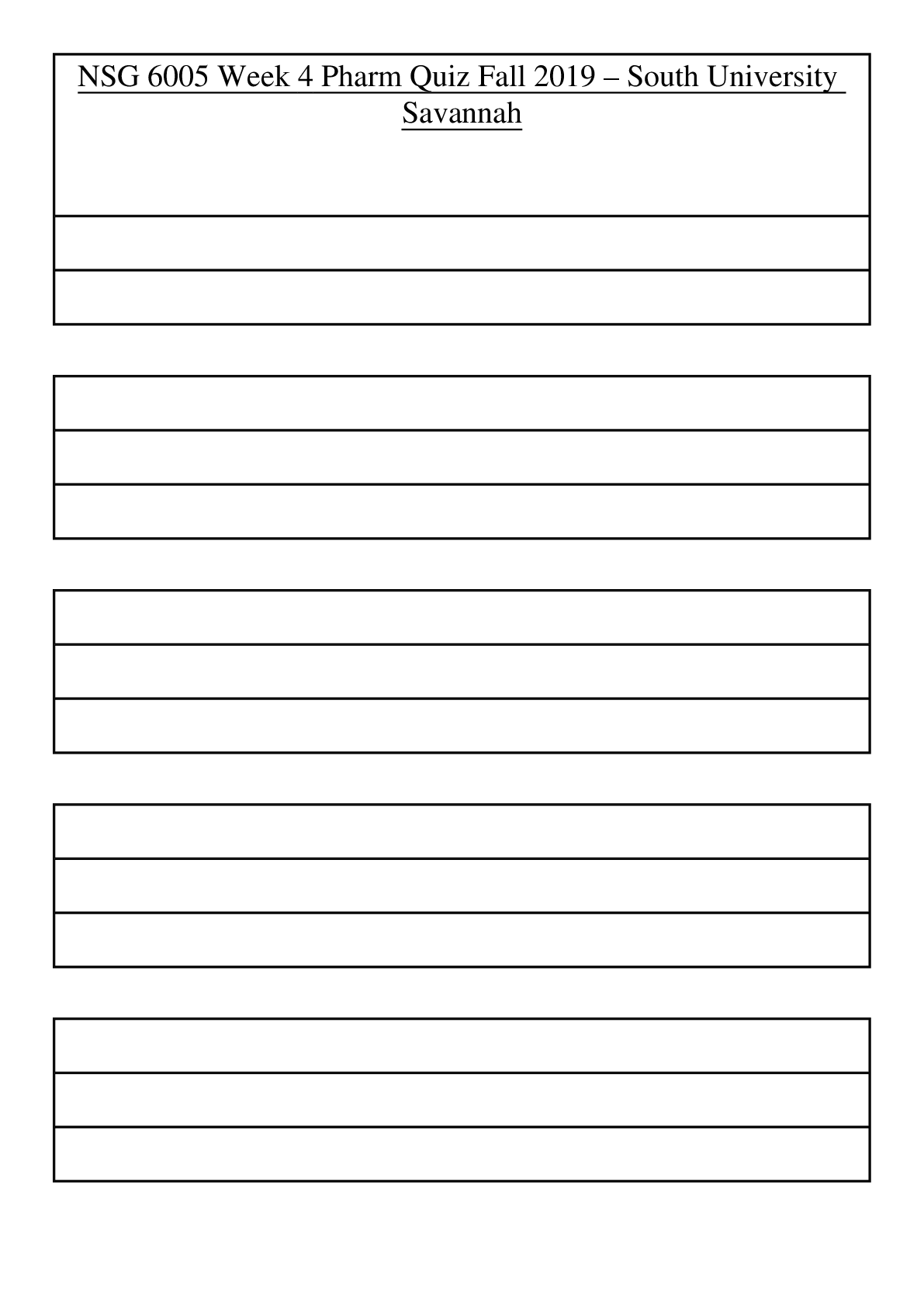
Reviews( 0 )
Document information
Connected school, study & course
About the document
Uploaded On
May 28, 2020
Number of pages
8
Written in
Additional information
This document has been written for:
Uploaded
May 28, 2020
Downloads
0
Views
50

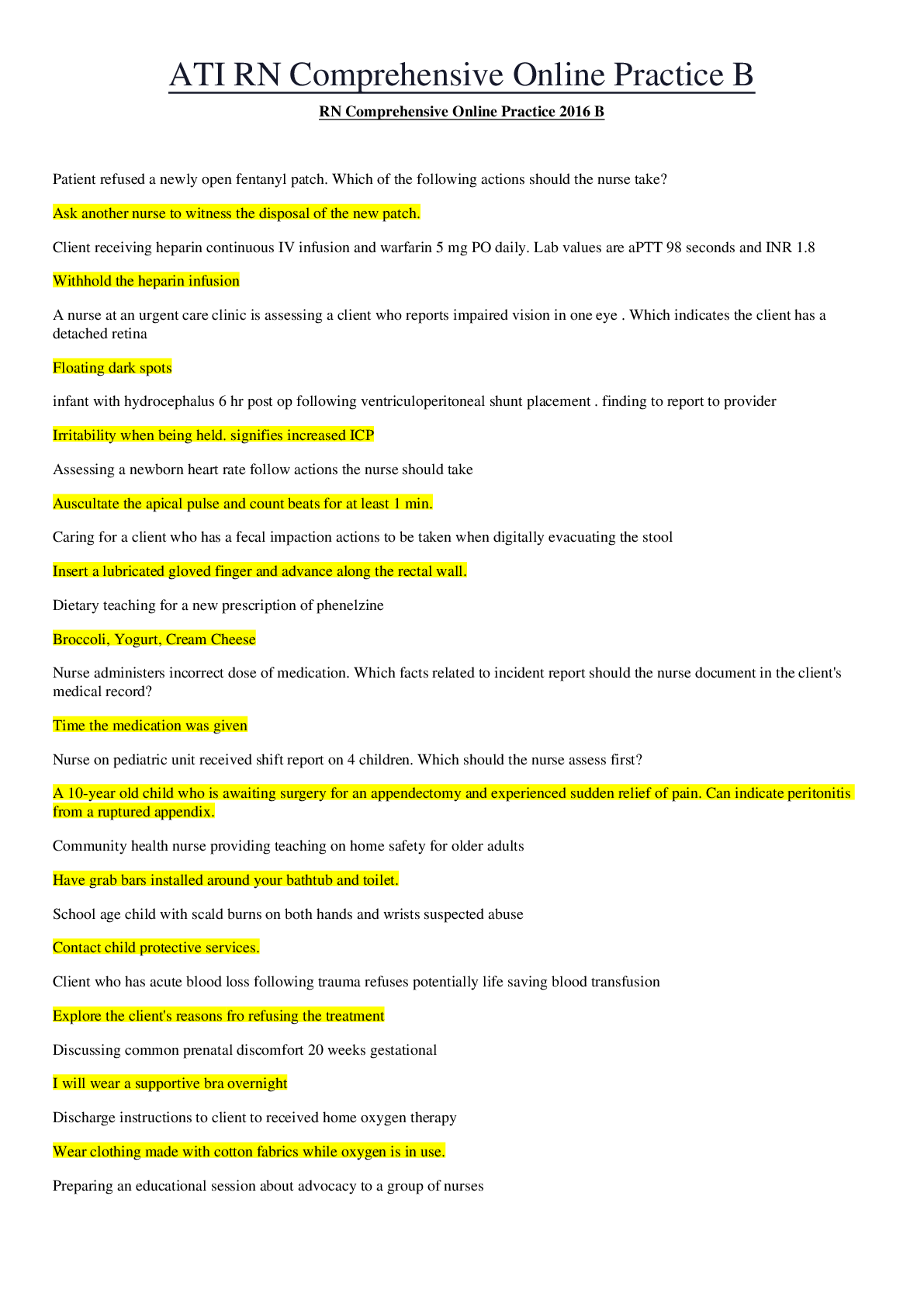
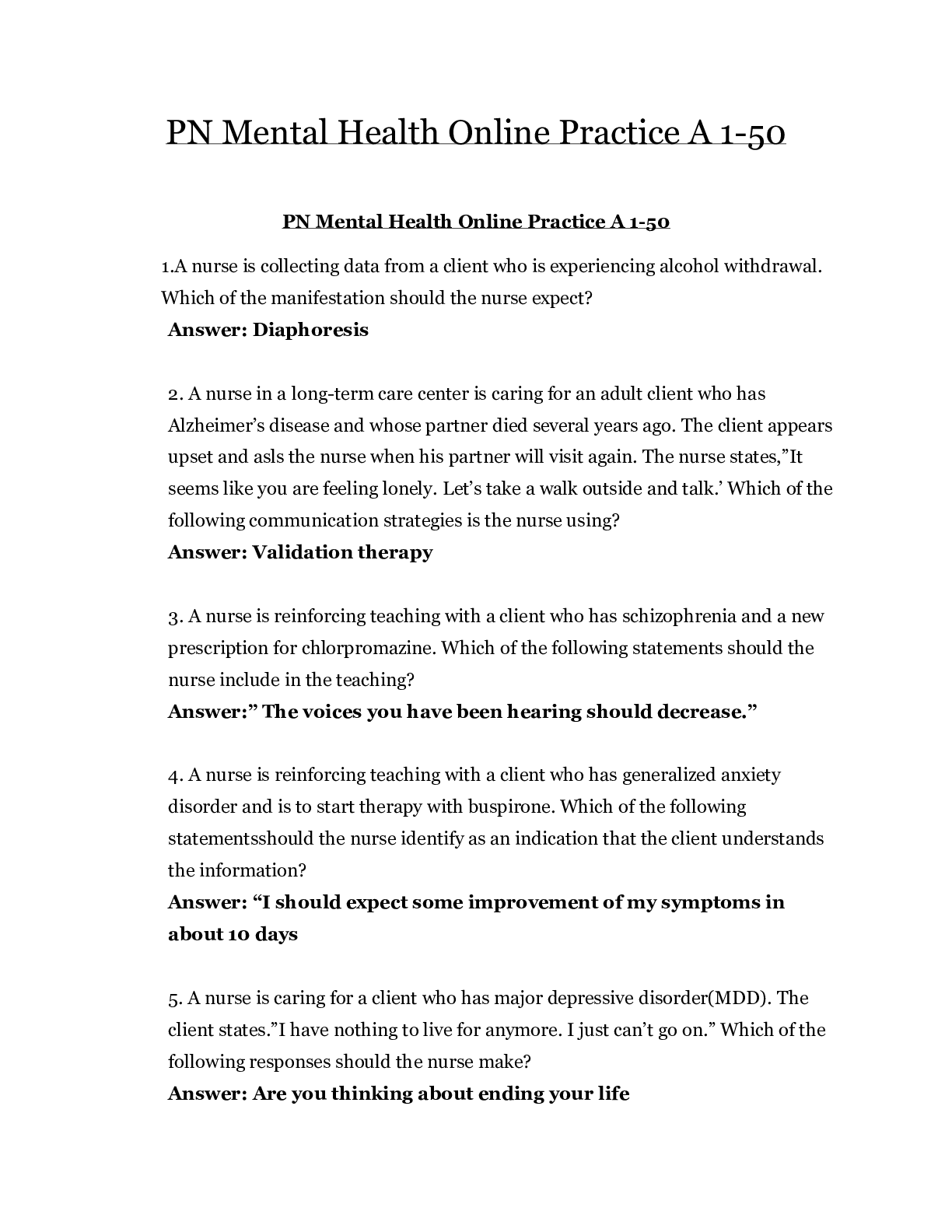
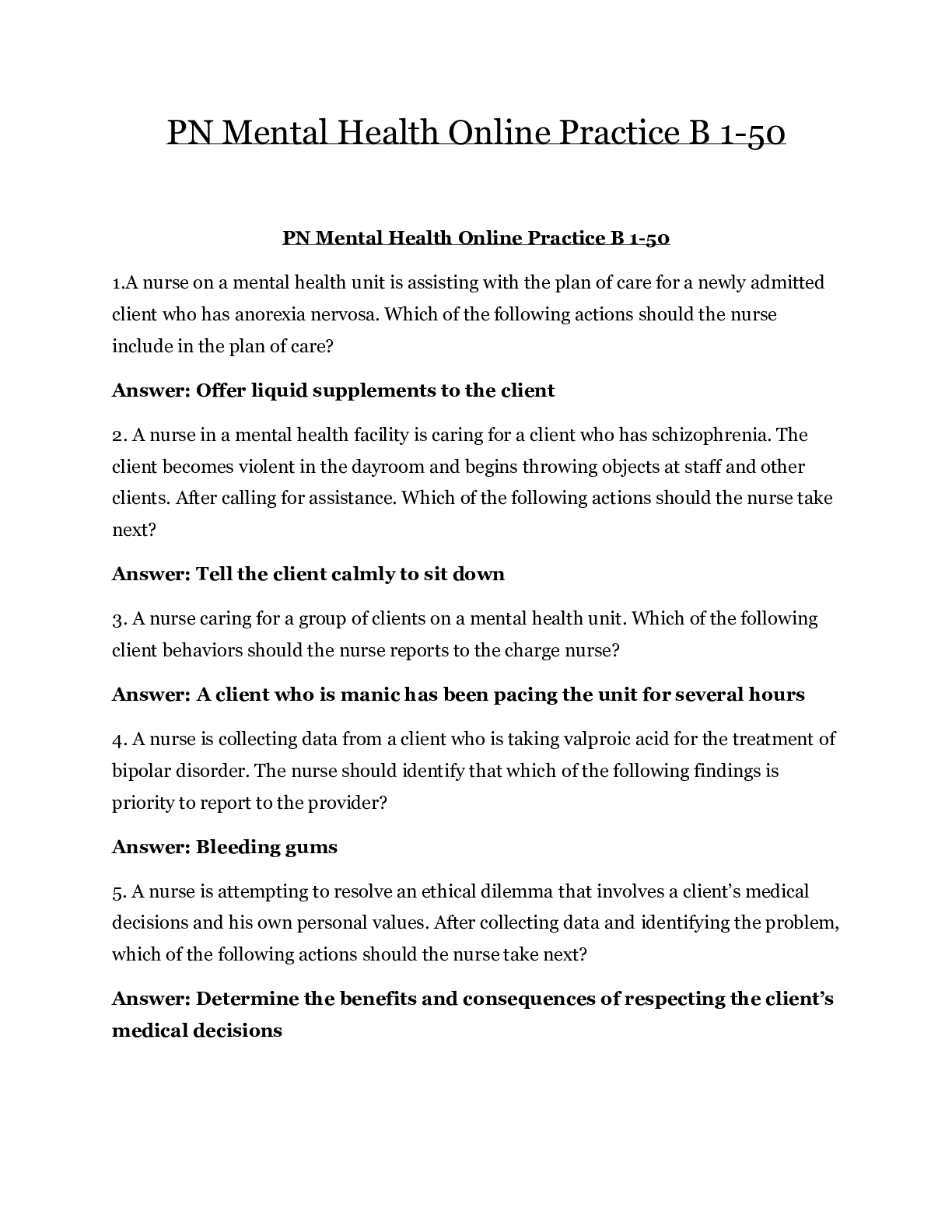
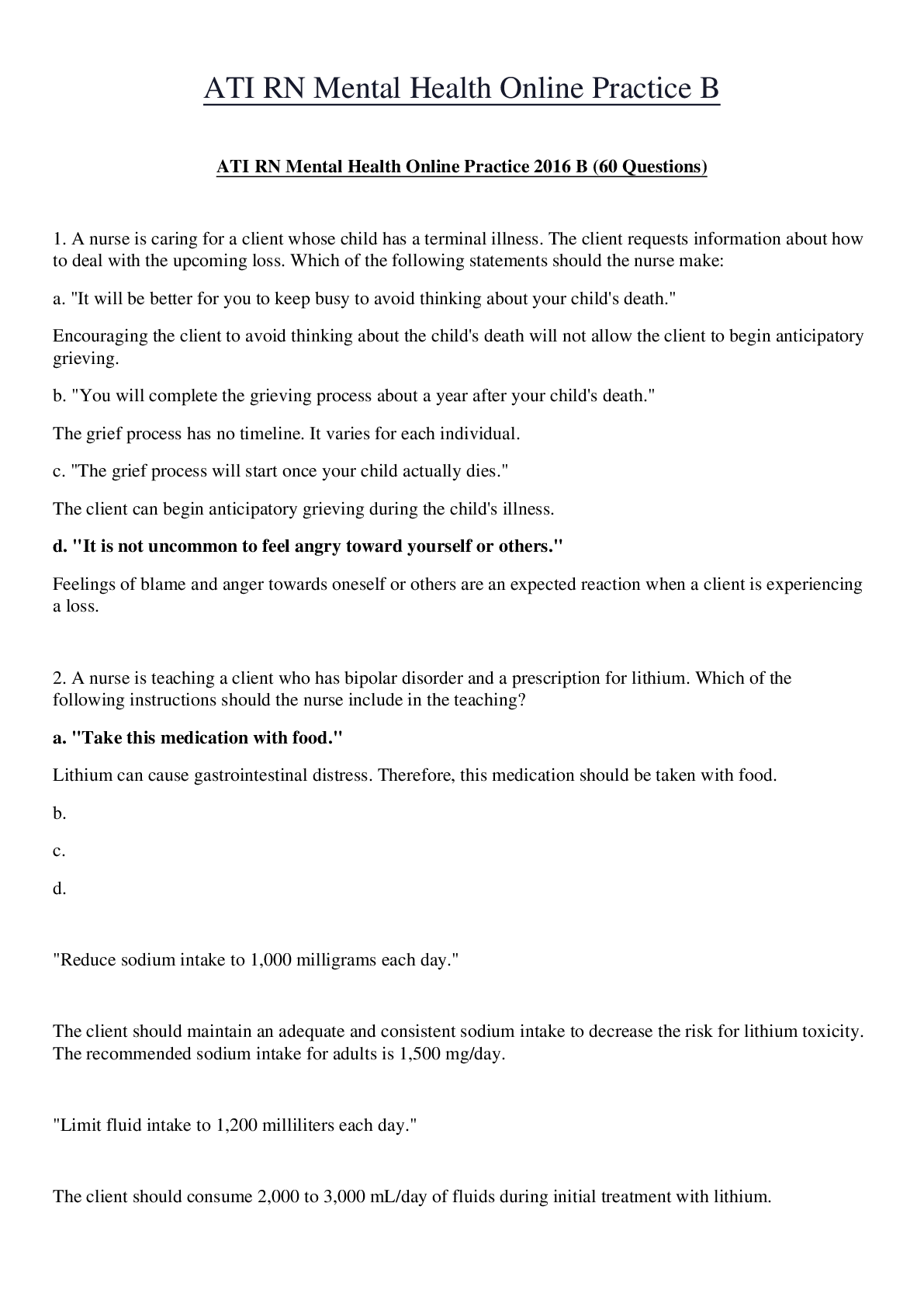
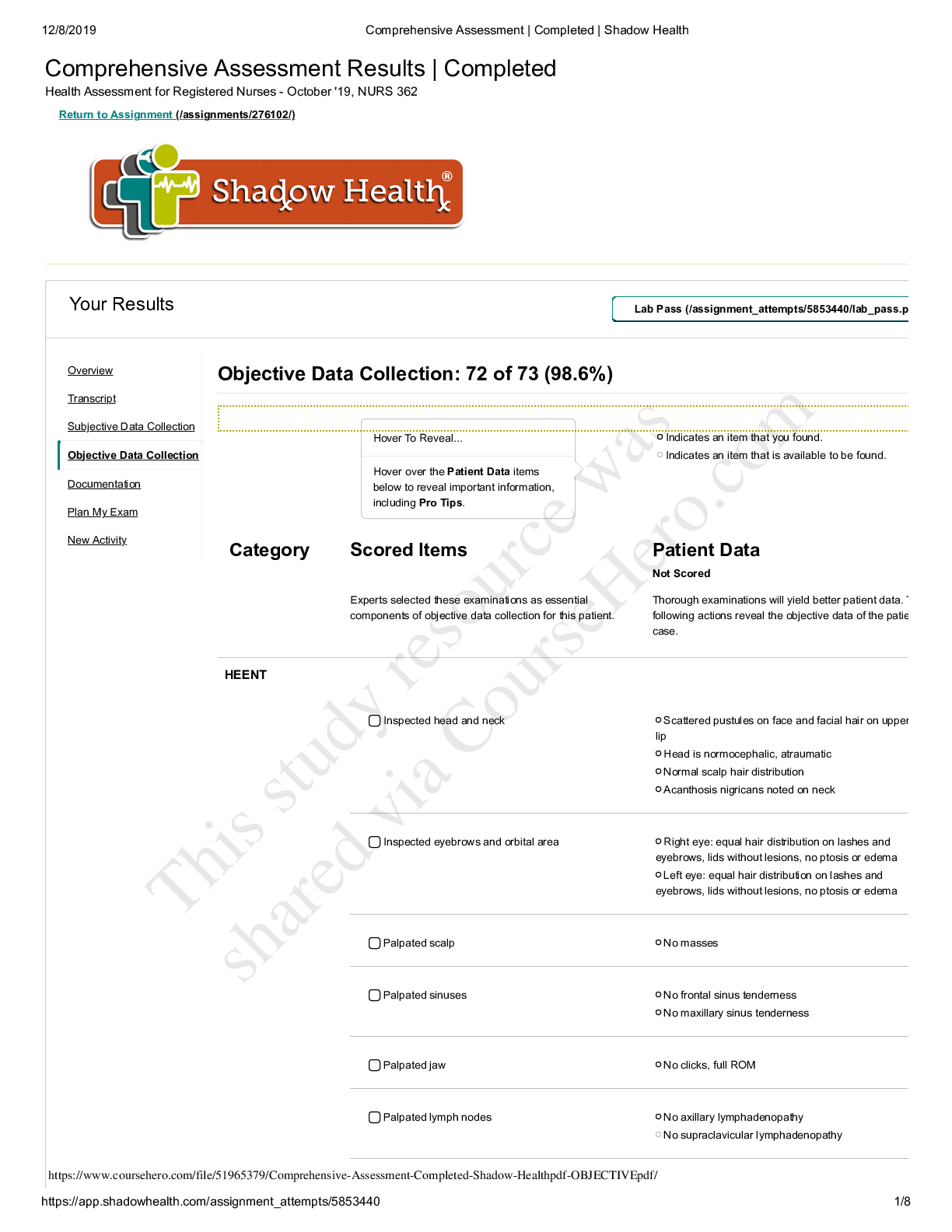

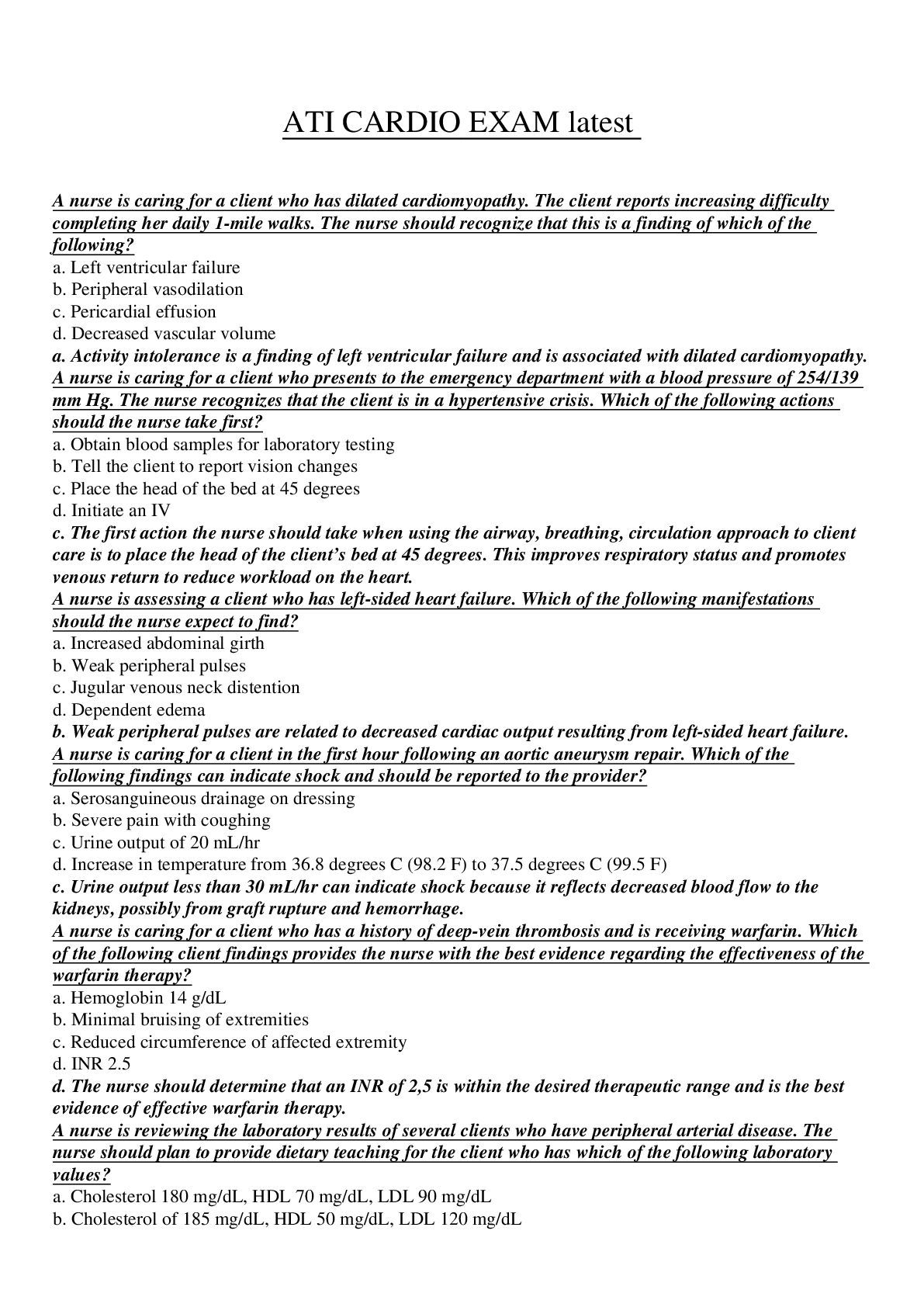
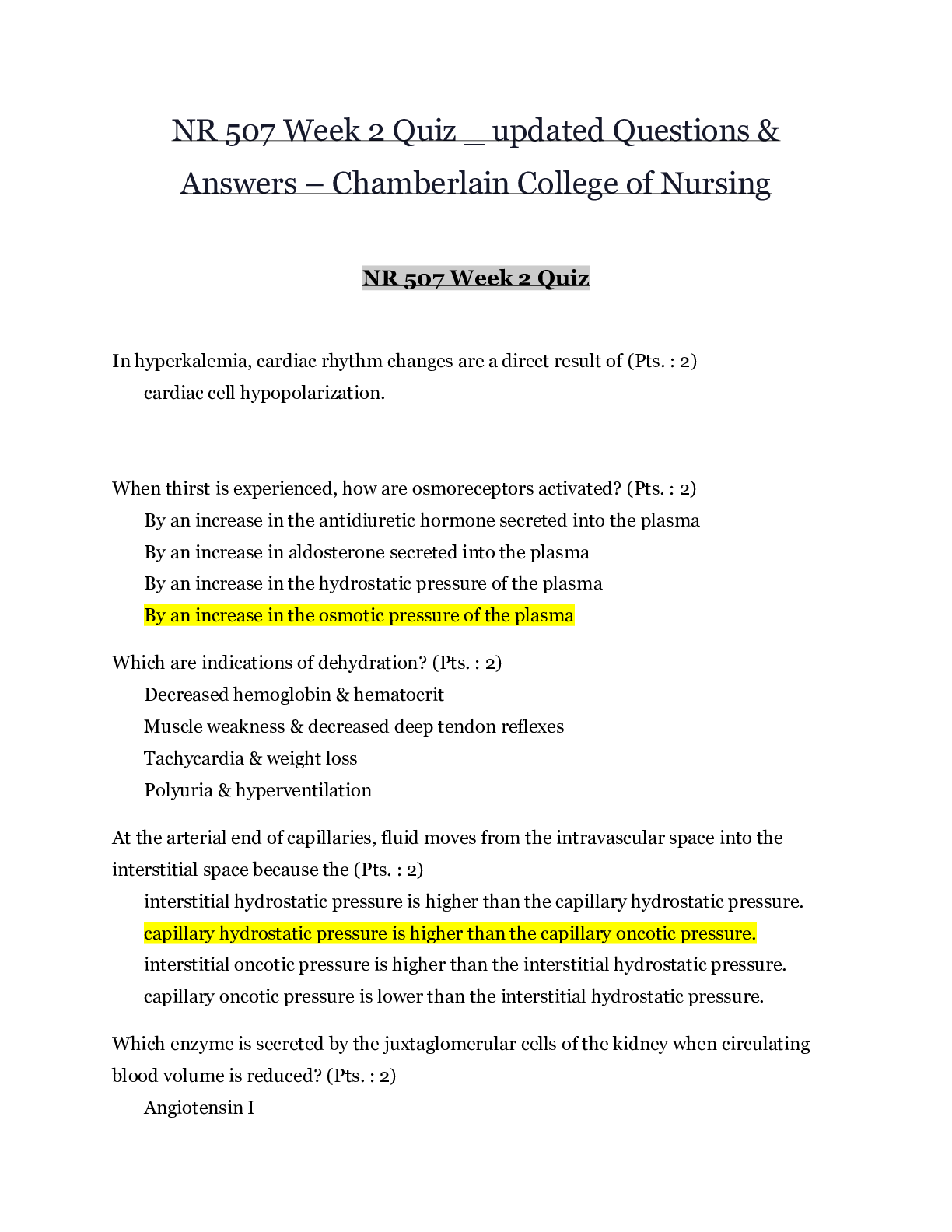
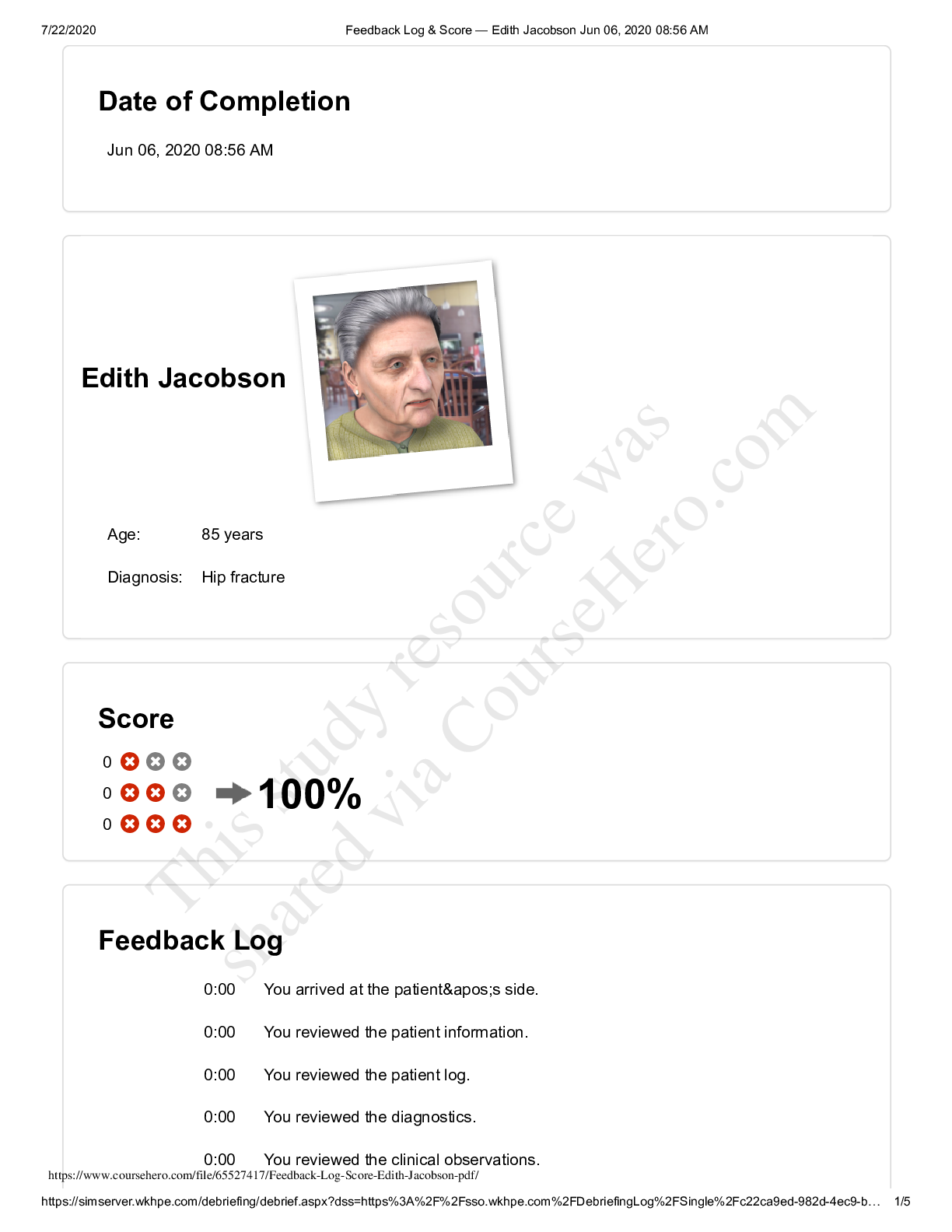
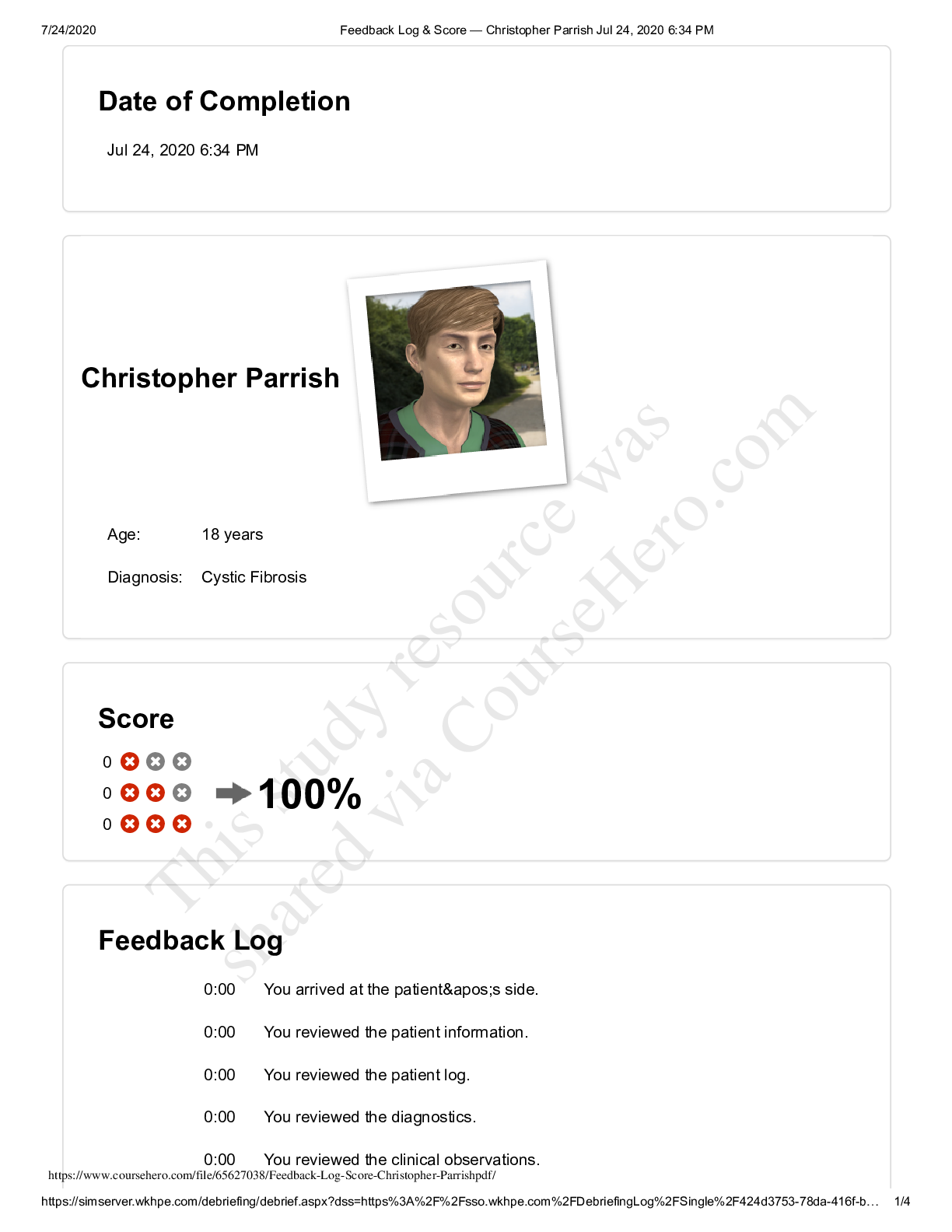
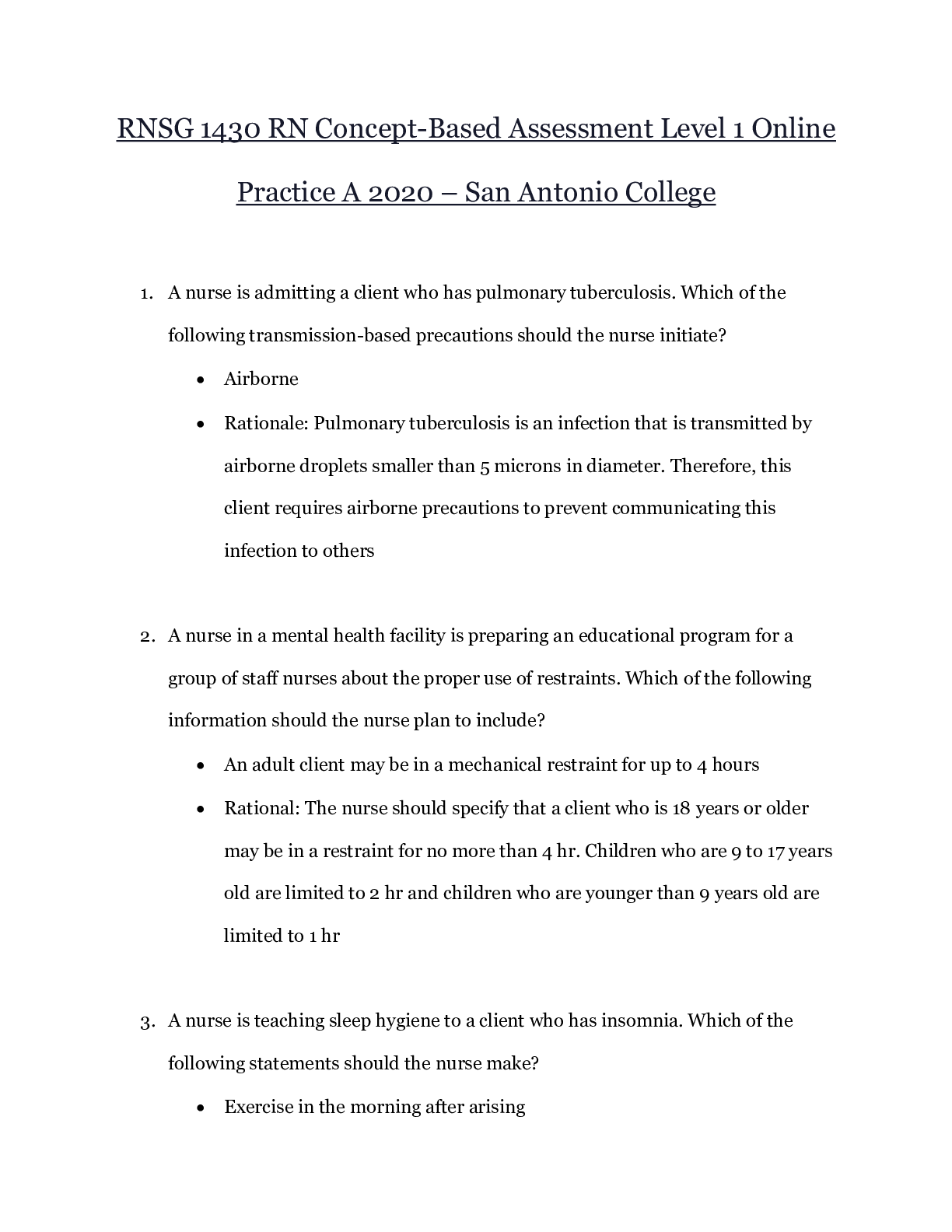
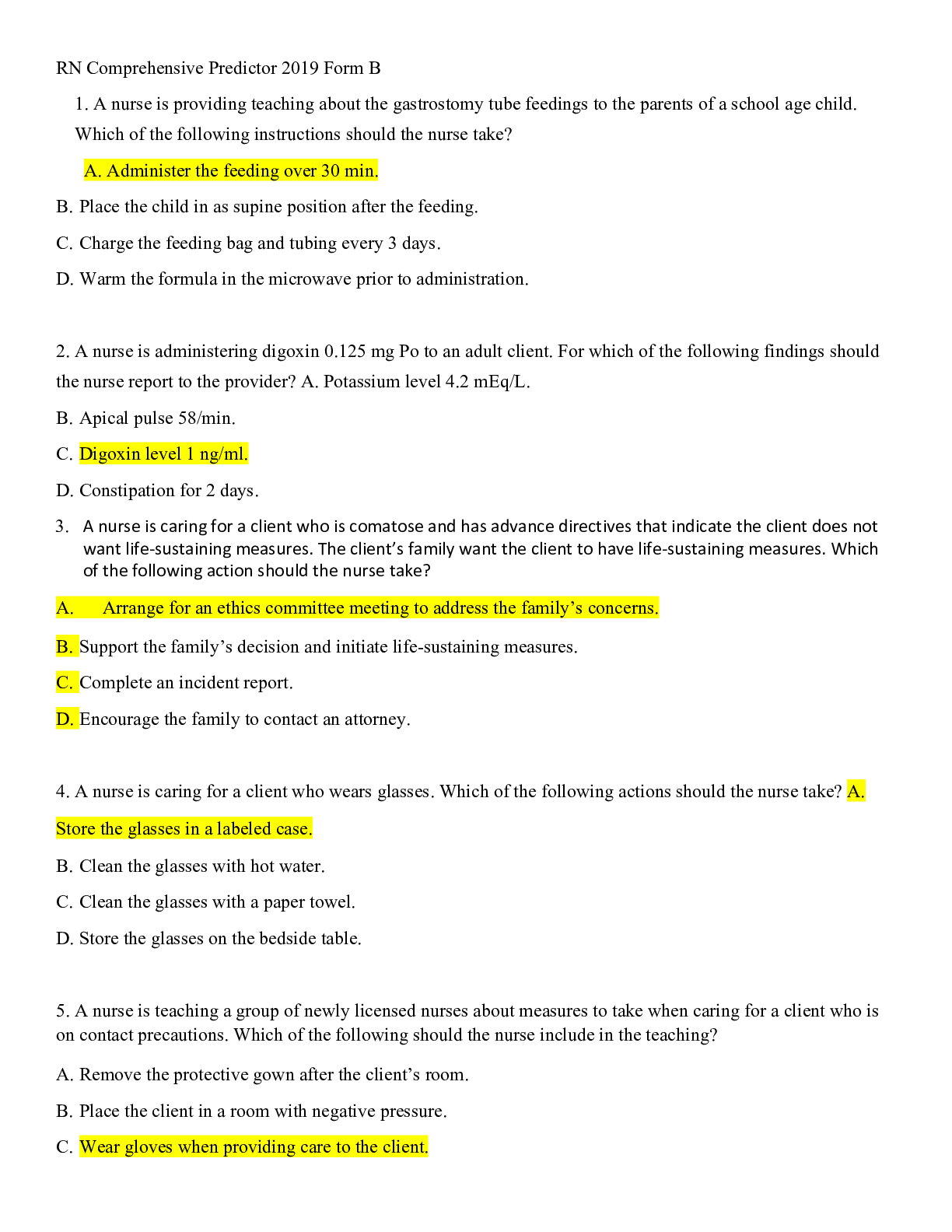

 – CHAMBERLAIN COLLEGE OF NURSING.png)
